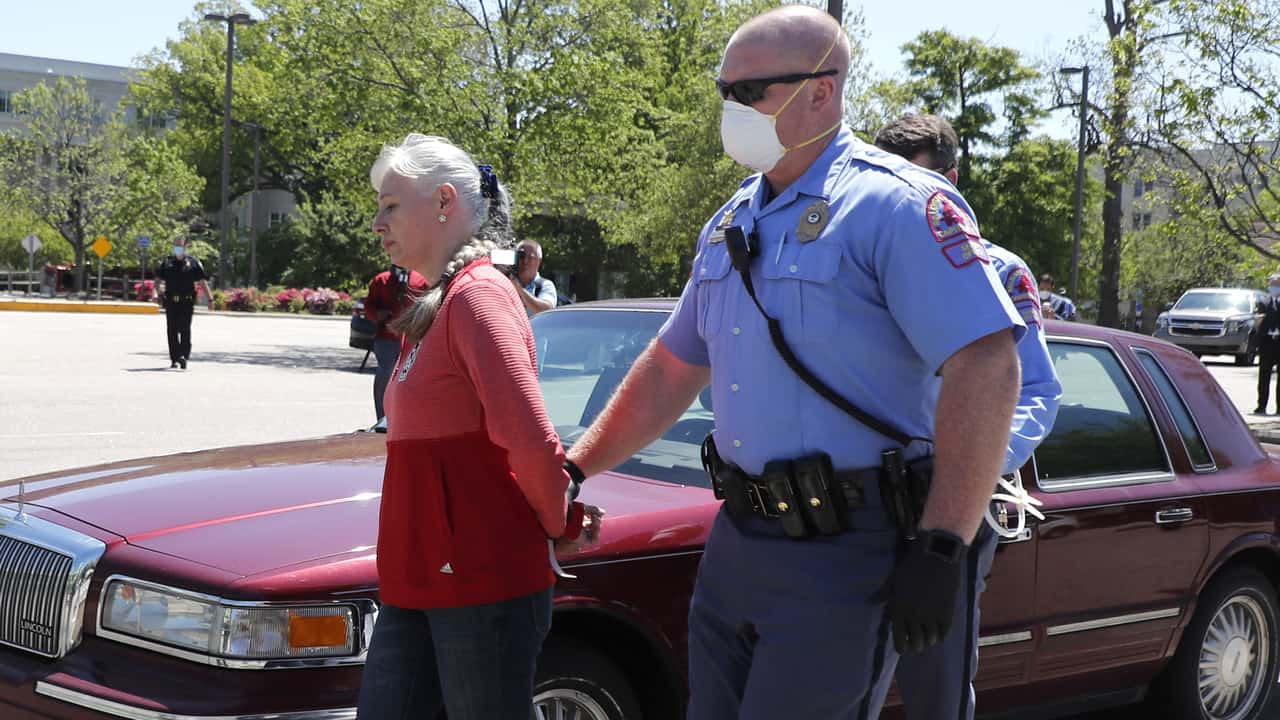Article, FEATURED STORIES, news, Politics, TRENDING, U.S.
Tea Party Funders Linked to National Lockdown Protests

A protester is arrested after refusing to disperse during a ReOpenNC rally in Raleigh, N.C., Tuesday, April 14, 2020. - Raleigh News & Observer
For the past two weeks, lockdown protests have been spreading in the country nearly as fast as the coronavirus itself. Starting in Ohio on April 14, the lockdown protests have picked up in at least 20 states. More are expected in the coming weeks in states like Tennessee, Illinois, and Oregon. The largest protest occurring in Michigan, with “thousands” of protesters according to the New York Times. Most protests have been smaller, though, containing a few dozen or a hundred protesters.
The lockdown protests have varied in size, content, and method, but share one goal—reopening state economies that have been shut down to slow the spread of the coronavirus pandemic.
Local activists are protesting measures put in place by state governors to limit gatherings of people. These measures are part of a global attempt to “flatten the curve,” or draw out the number of infections over a longer period of time. The goal of slowing the rate of infection is to prevent the healthcare system from becoming overwhelmed at once. By ensuring healthcare systems don’t breach capacity, more lives can be saved. Early evidence in states like New York and Pennsylvania suggests these methods have been effective and life-saving.
Working Families Suffer Economic Hardship
Flattening the curve has major economic drawbacks. The more successful states are at slowing the rate of infection, the longer lockdowns will have to be. The lockdowns have hit middle and working-class families hard. According to the Congressional Budget Office, unemployment rates are expected to be at 14 percent in the second quarter of this year, up from only 3.8 percent in the first quarter. In the past five weeks, the New York Times reports that 26 million people have filed for unemployment. Due to the massive demand, state unemployment offices are being overwhelmed. We still may not know the full scope of the impact.
While the government has issued some stimulus payments directly to the people and issued loans with the goal of helping small businesses, the help clearly not been enough to alleviate the concerns of all families. Although most Americans support the lockdowns and their governors’ actions (even across party lines), this is the anxiety driving most anti-lockdown protesters.
The activists are showing up sometimes in large crowds, mostly without masks, and mostly ignoring social distancing guidelines—often in direct violation of stay at home orders put in place.
These acts of civil disobedience have attracted the support of large conservative groups, right-wing propagandists, and President Trump himself.
Conservative Groups and Trump Allies Fund and Organize Lockdown Protests
New York Times reporter Jim Rutenberg reports that the protests have been receiving help with organizing, funding, and even legal aid from Tea Party-linked conservative groups, as well as people and organizations with close ties to the Trump administration.
“There were many tentacles from Washington leading into these various state protests,” he stated in an interview, “basically driven by people whose main concern probably isn’t solely whether you can go to the store tomorrow and buy some grass seed.”
Stephen Moore, who was recently appointed to Trump’s presidential commission on reopening the economy, advertised that he had a donor lined up in Wisconsin to pay the legal fees of anyone who was arrested participating in civil disobedience against the lockdowns.
“We need to be the Rosa Parks, here,” Moore said on Youtube, “and protest against these government injustices.”
Moore was working with Freedom Works, a conservative group that played an instrumental role in funding and astroturfing the Tea Party in 2009.
Freedom Works distributed a confidential document titled, “#ReOpenAmerica Rally Planning Guide” to its on-the-ground network. “We’ve done our part to flatten the curve – and now the government needs to get out of the way,” the document states.
Suggestions to activists in the document include follow proper social distancing guidelines and wear face masks—ironically the exact orders that protesters are countering.
The document also provides suggestions like sign messaging, stating, “Use nonpolitical messages,” “Keep it short,” and “Keep them homemade.”
In Raliegh, the law firm Micheal Best came to the defense of one protester who was arrested on April 14 for refusing to disperse. The law firm contains multiple tries to the Trump administration, including Reince Priebus, the former RNC chief and Trump White House Chief of Staff, a lawyer helping the President hide his tax returns, and another attorney working on Trump’s 2020 campaign. “This firm just couldn’t be more closely connected to the President,” Rutenberg said.
On April 17, President Trump himself tweeted in support of the protests.
Freedom vs. Public Health
The protests, while clearly operating against public health guidelines, have raised important questions about constitutional rights during a national crisis.
“This isn’t just about the economy. It’s about our freedom,” states the document created by Freedom Works.
The arrest of the protester in Raliegh, and police disbursement of public peaceful gathers across the country, has led some to question if the first amendment has been suspended. According to the American Bar Association, though, lawsuits along these lines will likely fail.
Their research indicates that states have the power to “impose curfews and quarantines, limit public gatherings, ban people and traffic from the street…” Section 361 of the Public Health Service Act.
Other organizations, like the ACLU, are more skeptical of federal overreach. In a statement, Hina Shamsi, director of the ACLU’s National Security Project, said the organization would be watching the government’s actions.
“Our government is most prone to committing abuses in times of crisis, and we must ensure that broad presidential powers are not misused beyond legitimate needs,” she said. “As the government takes the necessary steps to ensure public health, it must also safeguard people’s due process, privacy, and equal protection rights.”


